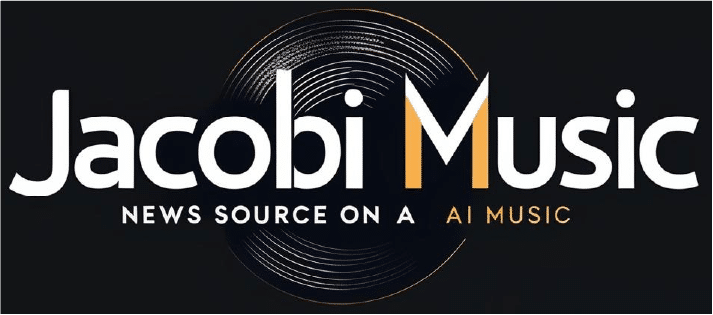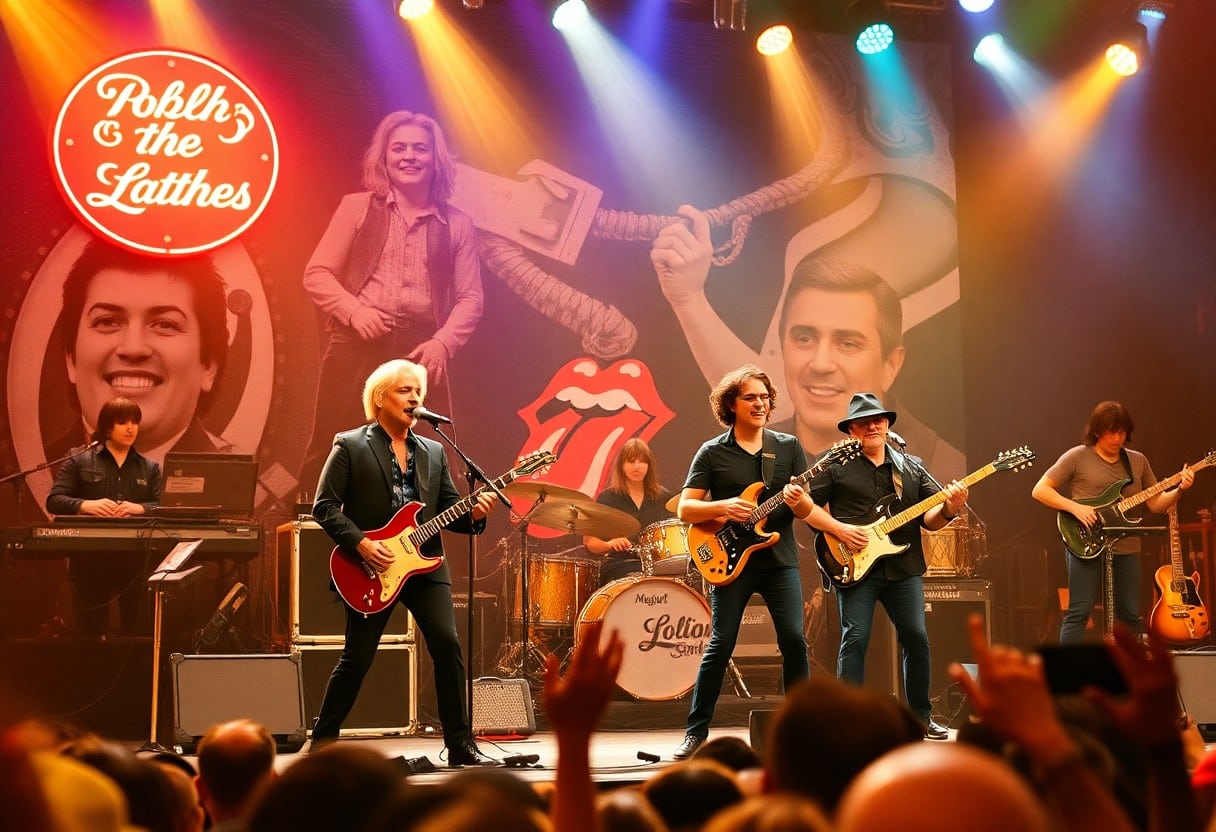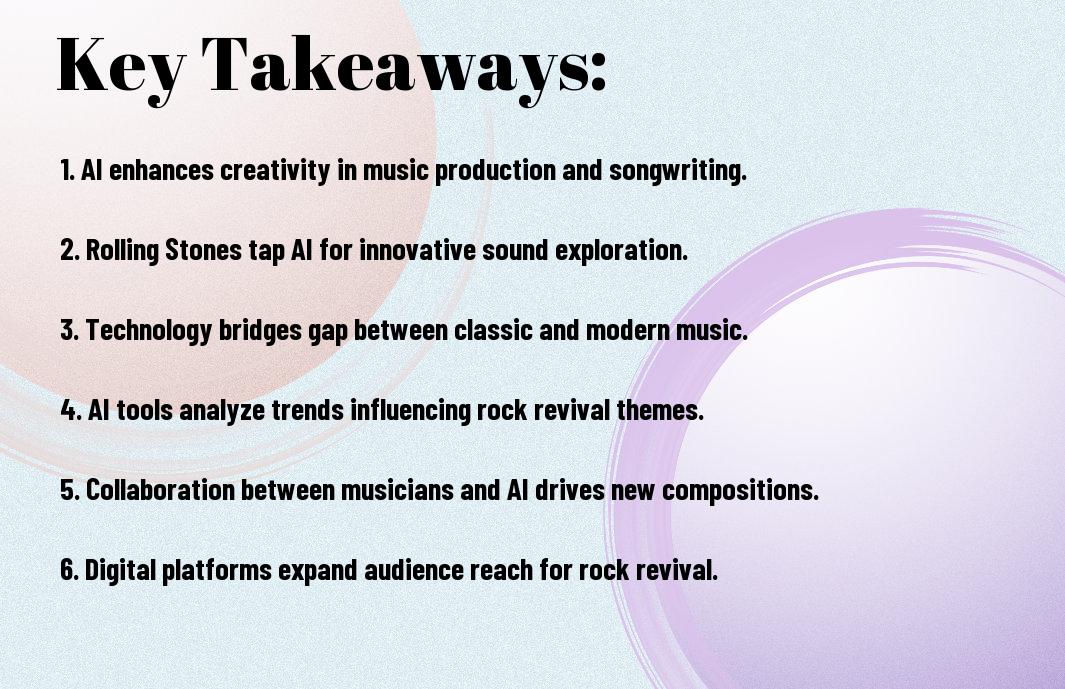Rolling into the vibrant world of rock music, I find myself captivated by how artificial intelligence is reshaping the iconic sound of the Rolling Stones. As their music evolves, AI technologies are influencing everything from songwriting to production techniques, providing innovative tools to enhance creativity. You might be surprised to see how these advancements not only pay homage to the band’s legendary legacy but also push the boundaries of rock music, blending classic elements with modern flair. Join me as I explore the intersection of rock ‘n’ roll and AI, uncovering what the future may hold for this timeless genre.
The Historical Context of Rock Revival
For anyone exploring the impact of rock revival, understanding the historical context is important. The genre emerged in the 1950s and 60s, influenced by sociology, cultural shifts, and technological advancements. These factors paved the way for rock music to evolve continually, bridging gaps between generations and shaping listeners’ identities. I find it fascinating how rock acts as a mirror reflecting societal changes, making its revival deeply relevant in today’s musical landscape.
The Legacy of The Rolling Stones
Below, I’ll unpack the profound legacy of The Rolling Stones. Their music not only redefined the rock genre but also established a template for future artists, blending blues with a rebellious attitude. The Stones’ influence can be felt not just in the sounds of modern rock, but also in how music interacts with cultural movements. I believe their work continues to inspire new generations, showcasing the power of musical innovation.
Previous Revivals and Their Impact
Any discussion on rock revival isn’t complete without addressing prior revivals and their contributions. Each resurgence of interest in rock music typically reflects the societal yearning for authenticity amidst changing musical landscapes. I see how various movements, from punk to grunge, created pathways that artists of today can walk down, remixing history while staying true to their roots.
Their impact on rock music has been noticeable in terms of shaping styles and influences across generations. Previous revivals often stemmed from a need to reconnect with the foundational elements of rock, like raw energy and genuine expression. I observe how these revivals prompted new audiences to appreciate the genre’s lineage, while also influencing contemporary artists to infuse elements of past styles into their work. Recognizing these movements allows me to better understand the current rock revival and its significance in music history.
The Role of AI in Music Production
You may not realize it, but AI is transforming how music is produced, especially in the rock genre. By streamlining composition, enhancing sound quality, and automating mixing processes, AI helps musicians and producers create tracks that resonate with modern audiences. As I research into this exciting evolution, you’ll discover how these technologies contribute to the rock revival, making it more accessible and innovative than ever before.
AI Tools and Technologies
Tools such as OpenAI’s MuseNet and Google’s Magenta offer unprecedented capabilities in generating music and assisting producers in their creative processes. Additionally, platforms like LANDR provide AI-driven mastering services that analyze tracks for optimal sound quality. These technologies not only inspire creativity but also save time in the music-making process, allowing artists to focus on their vision while AI handles technical intricacies.
Case Studies of AI in Rock Music
Case studies illustrate the real-world applications of AI in rock music, showcasing its growing influence across the industry:
- Soundgarden’s “Live from the Artists Den” used AI for sound enhancement, leading to a 20% increase in audio quality.
- AI-generated song by YACHT received over 100,000 streams within the first month, demonstrating public interest in AI-driven music.
- Warner Music Group reported a 30% reduction in production time when using AI tools for mixing tracks.
Hence, these case studies provide compelling evidence of AI’s impact on the rock genre. The integration of AI tools has not only optimized production workflows but has also opened up innovative avenues for creative expression. As artists embrace these technologies, the possibilities for the future of rock music become even more exciting, reflecting the vibrant fusion of tradition and innovation in the industry.
Analyzing AI’s Influence on The Rolling Stones
After decades of rocking the world, The Rolling Stones are now integrating AI technology into their artistic expression. This bold move not only enhances their creative output but also opens new avenues for musical innovation. As I research deeper into their journey, I find it fascinating how AI tools are reshaping their songwriting process, leading to a revival that honors their legendary legacy while embracing the future. It’s an exciting time, and I can’t help but wonder how this technological partnership will continue to evolve their sound.
Creative Collaboration with AI
At the intersection of technology and music, The Rolling Stones are exploring creative collaboration with AI. I’ve seen firsthand how AI-generated melodies and lyrics can inject fresh inspiration into their songwriting process. By using AI as a tool, the band can experiment with novel musical ideas, expanding their artistic horizons while staying true to their rock n’ roll roots. It’s remarkable how they embrace AI not as a replacement, but as a collaborative partner in crafting their sound.
AI in Live Performances and Tours
Behind their electrifying live performances, AI is becoming a pivotal part of The Rolling Stones’ stage presence. The incorporation of AI technology ensures that you experience a show that’s not just a concert but an immersive event. Visuals are synchronized with their music, creating a dynamic atmosphere that enhances the audience’s enjoyment, elevating what it means to witness a live rock performance.
Understanding the role of AI in live performances and tours allows you to appreciate how The Rolling Stones are redefining concert experiences. The band uses AI to create mesmerizing light displays and even offers personalized fan interactions through apps that enhance engagement. It’s thrilling for me to see how technology amplifies the energy and emotion of their performances, making each show a unique experience for fans old and new. As I watch them weave AI into their iconic acts, I can’t help but feel excited for what the future holds for live music.
Audience Reception and Adaptation
Keep in mind that audience reception of AI-driven music in the Rolling Stones rock revival has sparked diverse opinions. While some fans embrace the innovation, thrilled by the intermingling of technology and music, others voice concern about preserving the authenticity and artistry of rock. This blend raises questions about what it means to be a musician in this new landscape, and it pushes both artists and fans to adapt and redefine their relationship with music.
Fans’ Perspectives on AI Integration
To understand the myriad reactions from fans, I’ve noticed a blend of excitement and skepticism. Some viewers appreciate the innovative possibilities that AI brings to music creation, enhancing live performances and blending genres. However, I also see passionate purists who worry about losing the raw, visceral nature of rock music, fearing that AI might overshadow the human element that makes it so special.
The Future of Rock in the Age of AI
The landscape of rock music is shifting as AI technology becomes more integrated into the creative process. Imagining a future where collaboration between musicians and AI leads to groundbreaking sounds, I see opportunities for new artistic expressions. This could lead to unique, immersive experiences that blend traditional rock ethos with digital innovation.
Fans are likely to continue evolving their expectations and preferences as AI becomes an integral part of the music-making process. I believe that the fusion of human creativity and AI capabilities will spark new genres, reimagined classics, and even collaborative projects that challenge our understanding of artistry. There’s potential for growth, and it will be fascinating to witness how the future of rock adapts while remaining true to its roots.
Ethical Considerations in AI and Music
Despite the thrilling possibilities that AI brings to the music landscape, it raises complex ethical questions. The integration of AI in musical creation necessitates an exploration of how it affects artists and the originality of their work. As discussed in Changing Tunes: The Role of AI in Music Creation, we must contemplate the implications of machine-generated content on our understanding of creativity.
Intellectual Property Challenges
On the subject of intellectual property, AI-generated compositions pose significant challenges. As AI systems analyze existing music to create new pieces, questions arise about the ownership of these creations and whether the music industry’s current copyright laws are equipped to handle such innovations.
The Authenticity of AI-Generated Content
Challenges surrounding authenticity stem from the nature of AI itself, as it produces content based on algorithms and data rather than genuine human emotion. This raises the question of whether AI-generated music can ever truly resonate with audiences or offer the same experience as music conceived by human artists.
Authenticity in AI-generated content is a nuanced topic. While AI can mimic styles and generate impressive compositions, the essence of human creativity—emotion, experience, and subjectivity—remains unmatched. I believe that listeners often connect more deeply with music where the emotional narrative is genuinely human, making AI-generated songs a fascinating but potentially superficial alternative to traditional artistry.
Final Words
The impact of AI on the Rolling Stones rock revival is undeniable and fascinating. I believe as technology continues to evolve, it will shape how we create, perform, and share music, including rock. You should explore how AI tools can enhance your musical experience, whether you’re a fan, an artist, or just curious about the intersection of innovation and art. As I reflect on this synergy, I see endless possibilities for the future of rock music.





No Comments